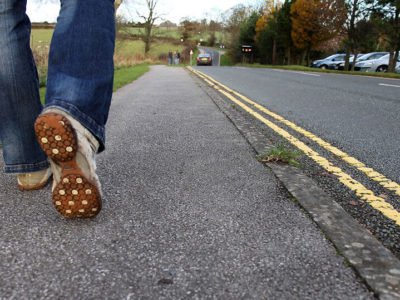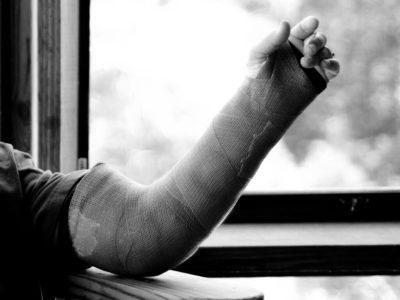When you feel people staring at you, you’re hoping that they’re admiring your outfit or maybe they know you from class, like, “Oh yeah, she made that hilarious joke last week!” Well, when people stare at me, I feel like they’re trying to guess what’s wrong with me.
During my senior year of high school, I started getting pains in my feet that forced me to wobble down the stairs like a penguin. But trust me—they weren’t Happy Feet. At first, it seemed like I developed an allergy to one of the medications I was taking, so my doctor took me off it. The pain went away, and I went off to college like nothing had ever happened. That should have been the end of it, right?
Except that in April of my freshmen year, I experienced excruciating pain every single time I tried to climb down from my lofted dorm bed.
It took until the summer after my sophomore year to officially be diagnosed with “undifferentiated connective tissue disorder,” which is about as vague as you can get here. In three years, I’ve only shown two symptoms of what could be hundreds of different things. My doctors cautiously say that I could have lupus, but, again, with only two symptoms, it’s hard to say for sure. I get the symptoms, but not the simple explanation.
Whether I have lupus or not, I am classified as having an invisible illness, which is an illness where the symptoms can’t be seen easily. It’s like my body has its own language, and I’m suddenly taking a crash course to interpret it for the rest of the world. This language communicates through joint pain in my feet, wrists, ankles, knees and occasionally in my neck, sometimes so badly that I can’t turn my head side to side. I occasionally get mouth sores that kinda feel like having bitten your tongue, which wouldn’t be the worst thing in the world if it didn’t make eating basically anything painful. On the bright side, the easiest remedy is to have a popsicle, so that’s nice for me.
It’s no “My dog ate my homework,” but it does get hard, sometimes even embarrassing, to explain to your professors that you’re late to class because you were in so much pain that walking to class felt like a pilgrimage. I went to a high school where it was, “Walk fast or miss class.” So I’m proud of my speed-walking abilities, and I don’t want people thinking I’m just lazy. It sucks to sit out of practice for Greek Life Recruitment because you can’t be on your feet as long as everyone else, despite however much you might want to be. On University of Iowa’s campus, walking to class feels like an endurance test normally because of the hills, but hobbling up and down them takes about ten minutes longer than I care to be moving, especially in the -20 degree winters when I want to be inside as soon as humanly possible.
Thankfully for me, everyone I’ve ever told about my diagnosis has been supportive and understanding. I’ve made a habit of talking to my professors the first day of class, and usually they sympathize with me and don’t mind me being a few minutes late. When I’m having a really bad day, sometimes I can’t go to class at all and they do what they can accommodate me. My sisters in my sorority look after me, reminding me that it’s okay if I need to sit down and get off my feet. Sometimes it’s hard to accept that, at 21 years old, I am at the whims of my body like someone’s grandmother. I actually take the same medication that my own grandmother takes for her arthritis, if that gives you any indication of what I’m dealing with here.
I know not everyone has been this lucky. I’ve read stories about people with my same diagnosis who experience so much pain that they can’t walk at all and need a wheelchair. But when you think about your future at college, you think about how it’s a time to be full of life, going to parties and football games and on mini adventures with your roommates. I can still do those things, but my diagnosis means that I have to regulate myself. I need to wear comfy shoes instead of heels, or permanently seat check as soon as I walk in the door because I’ll be in and out of that chair all night.
My college experience will still be four years I’ll never forget, but it’ll be in a different way than anyone else’s.



















